April 19, 2024 | 12:59 GMT +7
April 19, 2024 | 12:59 GMT +7
Hotline: 0913.378.918
April 19, 2024 | 12:59 GMT +7
Hotline: 0913.378.918
On June 23, the Ministry of Agriculture and Rural Development partnered with the Dak Lak People's Committee to host a conference evaluating and reviewing the execution of the Coffee replanting program from 2014 to 2022, and deploying the scheme from 2021 to 2025.
According to the Department of Crop Production's report, the coffee replanting effort has resulted in a number of positive outcomes, including the rejuvenation of old, diseased, and low-yield coffee gardens that are unable to recover. The average output of the replanted garden was 2,8 tons per hectare, surpassing the target by 0.1 tons per hectare.
The replant and renovation hybrid area of the High Central coffee region reached 129,008.4 hectares between 2014 and 2021 (reaching 107.5 percent of the plan). The combined area of coffee replanting and renovation hybrid was 166,579.2 hectares from 2011 to 2021.
Almost the whole coffee area was replanted with new varieties; the trees grew and developed well, produced a high yield, were of excellent quality, and brought very clear economic benefits, thereby contributing to the program for the sustainable development of coffee.
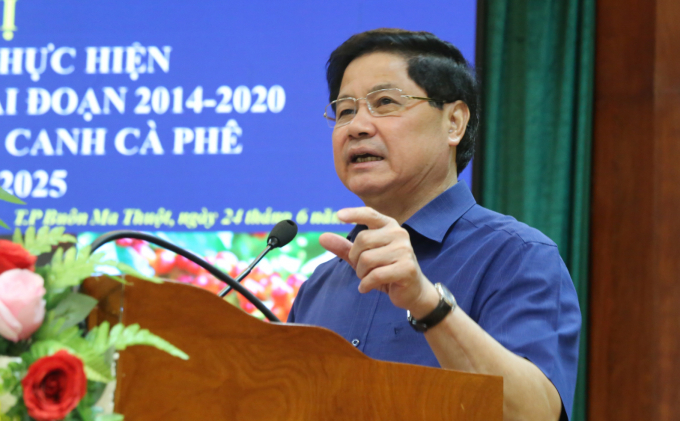
Deputy Minister of Agriculture and Rural Development Le Quoc Doanh spoke at the conference. Photo: Quang Yen.
Coffee business households adhered to the replanting process, which included categorizing coffee before replanting, setting up matchy replanting techniques based on the age of the garden, the rate of disease, and the yield of the coffee garden, as well as reducing crop rotation time; and bringing high-yielding and high-quality robusta varieties such as TR4, TR9, TR11, TR13, and TRS1 among others.
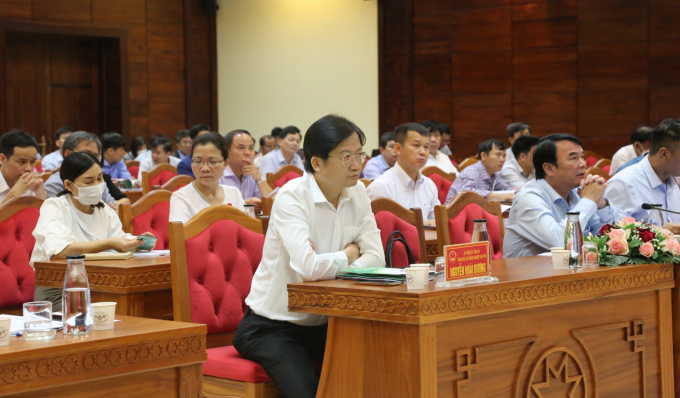
Overview of the conference. Photo: Quang Yen.
According to Mr. Cao Thanh Son, Deputy Director of the Central VnSAT Project Management Board, the VnSAT Project has trained 9,000 farmers to replant 10,000 hectares of sustainable coffee. Training operations were complemented at the central level by technical support units (National Agricultural Extension Center, Department of Crop Production, and WASI Institute among others).
The VnSAT Project was implemented in cooperation with the Provincial Agricultural Extension Center, the Seed Center, and the Plant Protection Sub-Department, among others. The training achievements of the initiative to date have exceeded the aim of 30,898 farmer families by 343 percent; 29,899 hectares have been taught (reaching 298 percent of the set plan).
The initiative offered quality and standard varieties for the replanting of 10,000 hectares of coffee. It prioritized a portion of capital to complete certification and upgrade 57 private seed nurseries, state-level seed nurseries, and prominent seed nurseries.
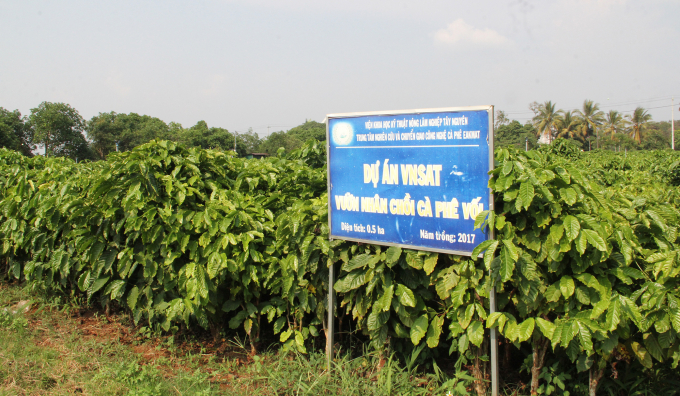
The VnSAT project sponsors investment in breeding gardens for the Central Highlands provinces. Photo: Quang Yen.
Until now, the VnSAT Project has qualified 51 private nurseries to participate in the VnSAT project; by supporting the modernization of 11 state nurseries and 21 private nurseries, the upgraded nurseries have supplied the market with over 12.6 million quality seedlings for replanting 12,000 hectares of coffee.
By the end of the project, 10,000 hectares were replanted utilizing suitable techniques, certified seed sources, and sustainable agricultural practices. Through active support actions, the project's replanting area for coffee has been expanded to 18,283 hectares, achieving 183 percent of the intended goal.
MARD aims to replant and renovate hybrid about 107 thousand hectares of coffee between 2021 and 2025, including 75 thousand hectares of replanting and 32 thousand hectares of renovation hybrid. After replanting and upgrading coffee gardens throughout a steady trade period, the average yield per hectare is expected to reach 3.5 tons of coffee kernels per hectare. After replanting and renovating, the income per hectare of coffee climbed 1.5 to 2 times compared to the preceding period.
The 2014-2020 replanting program has yielded some spectacular outcomes. To further extend this initiative, central and local authorities have developed replanting situation follow-up plans through 2025, with a view toward 2030.
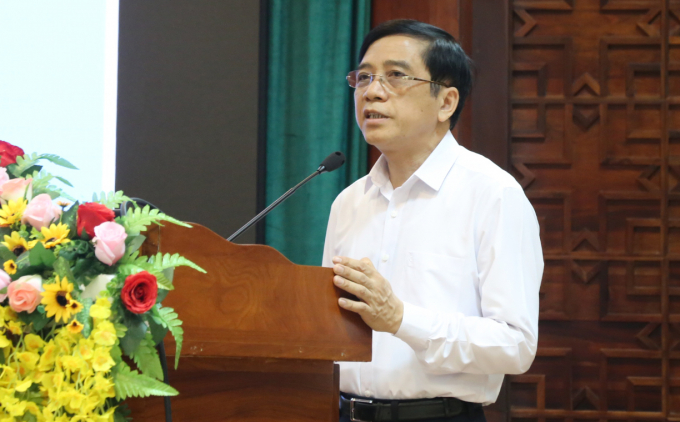
Mr. Le Van Duc, Deputy Director of the Department of Crop Production - Ministry of Agriculture and Rural Development reported the results of the coffee replanting project. Photo: Quang Yen.
Mr. Do Xuan Dung, Deputy Director of the Dak Lak Provincial Department of Agriculture and Rural Development, stated that local coffee has both economic and cultural significance. For replanting, the region has employed innovative technology, including drip irrigation and coffee varieties supplied by the WASI Institute.
"Dak Lak replanting program mainly uses new varieties. This increases output and rejuvenates aging coffee gardens. Over the past time, the region has had several initiatives to promote seedlings and provide financing for replanting." Mr. Dung stated.
Deputy Minister of Agriculture and Rural Development Le Quoc Doanh stated at the conference that the replanting initiative has had a remarkable effect on Vietnam's coffee industry, which has not lowered productivity and production. Vietnamese coffee increases output and productivity. Vietnam's coffee yield grew from 23.5 quintals per hectare in 2011 to 28.2 quintals per hectare in 2021, and from 1.27 million tons to 1.81 million tons.
The total area of coffee replanting and grafting surpassed 150,000 hectares by 2020, which is an increase of 30,000 hectares above the initial target.
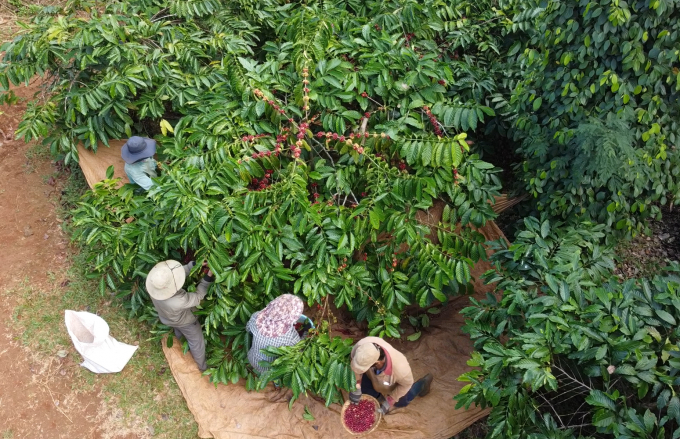
Replanting coffee helps increase yield and quality. Photo: Quang Yen.
The Ministry of Agriculture and Rural Development will continue to authorize the coffee replanting project for the years 2021-2025 due to the success of the project for the period 2014-2020. The coffee replanting project for the period 2021-2025 is undertaken not only in five provinces of the Central Highlands, but also in Son La, Dien Bien, Quang Tri, Binh Phuoc, Dong Nai, and Ba Ria-Vung Tau.
For efficient replanting in the period 2021-2025, Deputy Minister Le Quoc Doanh asked localities to continue to analyze, categorize, and identify the old coffee area of each household in order to build a strategy for replanting, breeding, and renovating annually that is suited to each locality's real circumstances. Specialized agencies under the Ministry are required to continue to supplement and perfect the replanting process, particularly for arabica coffee suitable for Son La, Dien Bien, and Quang Tri. The Western Highlands Agriculture & Forestry Technical Institute (WASI) is in charge of continuing research and testing to put into production new coffee varieties to serve the replanting needs of the provinces, paying special attention to the set of arabica varieties suitable for both the Central and Northwest region.
Translated by Linh Linh
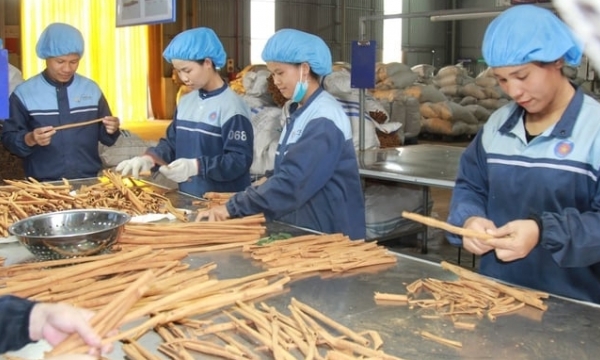
(VAN) Businesses and farmers have closely collaborated to develop organic cinnamon production area, with investments in high-tech deep processing factories for export.
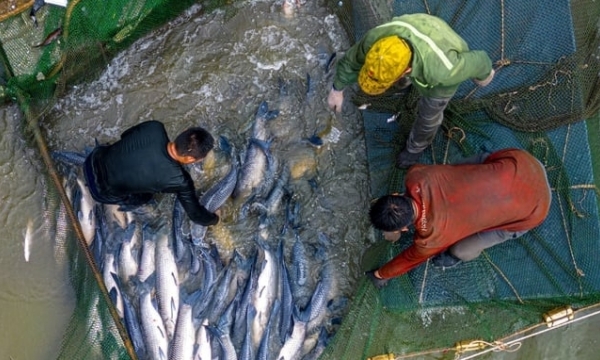
(VAN) With the 15 trillion dong credit support package for the forestry and aquaculture sectors recently achieving its goal, the State Bank proposed to double the scale in 2024.
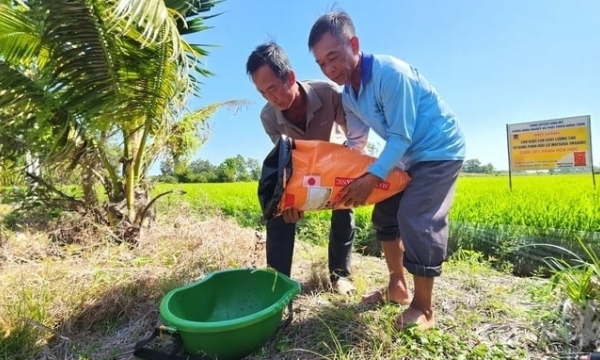
(VAN) The inaugural training session for trainers on the Fertilizer Right Project has officially begun, providing information and skills on the appropriate utilization of fertilizers in agriculture.
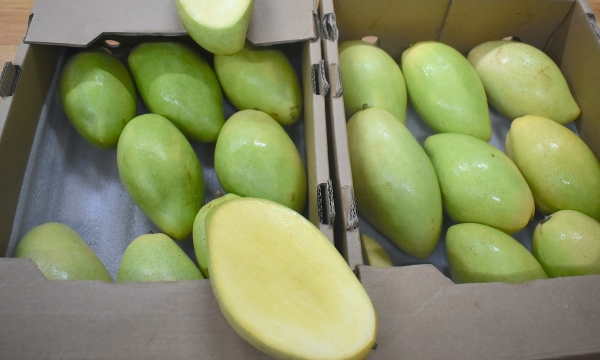
(VAN) Fresh mangoes typically have a shelf life between 5 and 7 days. However, standard operational procedures can extend this period to a minimum of 21 days and potentially up to 35 days.
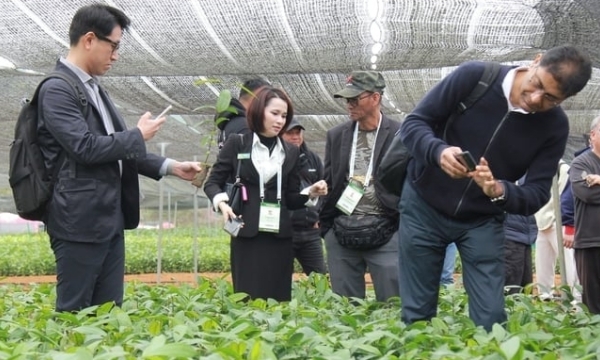
(VAN) Yen Bai plans to establish 90,000 hectares of stable cinnamon production area by 2025, which includes 35,000 hectares of intensive production area and 20,000 hectares of certified organic production area.
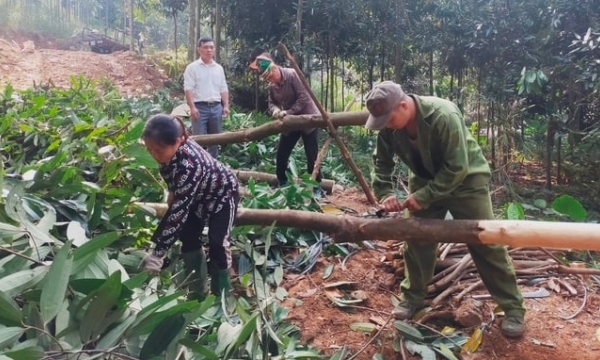
(VAN) A cooperative in Yen Bai province, with over 1,000 hectares of organic cinnamon and 800 participating households, exports its products to various international markets including the United States, Japan, South Korea, and France.
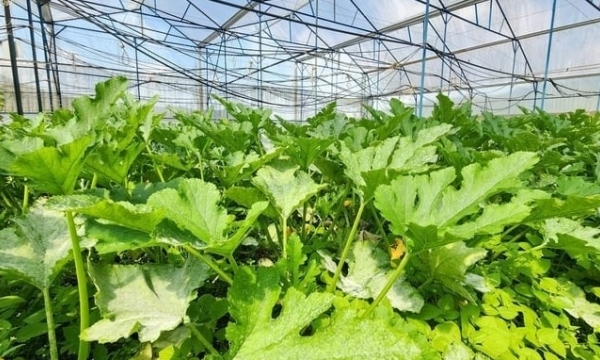
(VAN) The application of digital transformation in agriculture still has many difficulties and obstacles due to the limited awareness of most businesses, production facilities, and farmers.